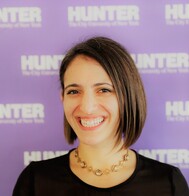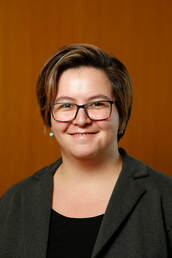Leadership
The SGM SIG leadership consists of two co-chairs and two student representatives. The primary responsibilities of the leadership are to facilitate the day-to-day operations of the SIG, to act as a liaison between the SIG and the ABCT leadership, to organize activities and events related to the annual convention, and to ensure that members’ needs are being met. In addition, the leadership develops and executes new initiatives based on members’ interests. Of note, we strive for a leadership that reflects the diversity of our members.

Danielle Berke
Co-chair, 2022-2025
Danielle Berke, Ph.D., (she/her) is a clinical psychologist and Assistant Professor of Psychology at Hunter College and The Graduate Center of the City University of New York where she directs the GenderBased Violence research laboratory. Her active program of research focuses on the identification of strategies for resisting and healing from gender-based violence among communities marginalized by systems of oppression at the intersections of racism, cisgenderism, and heterosexism. This work is both laboratory and community-based using: 1) biopsychosocial methods to specify the role of discrimination in the etiology and maintenance of trauma-related health inequities among people marginalized on the basis of their sexual orientation and/or gender identity and 2) community-engaged implementation science methods to tailor and deliver violence prevention and trauma recovery services with and for these communities. A fundamental end goal of this research is to uncover the structural workings of gender-based violence to promote health equity and wellness for sexual and gender minority people in all their diversity.
Co-chair, 2022-2025
Danielle Berke, Ph.D., (she/her) is a clinical psychologist and Assistant Professor of Psychology at Hunter College and The Graduate Center of the City University of New York where she directs the GenderBased Violence research laboratory. Her active program of research focuses on the identification of strategies for resisting and healing from gender-based violence among communities marginalized by systems of oppression at the intersections of racism, cisgenderism, and heterosexism. This work is both laboratory and community-based using: 1) biopsychosocial methods to specify the role of discrimination in the etiology and maintenance of trauma-related health inequities among people marginalized on the basis of their sexual orientation and/or gender identity and 2) community-engaged implementation science methods to tailor and deliver violence prevention and trauma recovery services with and for these communities. A fundamental end goal of this research is to uncover the structural workings of gender-based violence to promote health equity and wellness for sexual and gender minority people in all their diversity.

Ilana Seager van Dyk
Co-chair, 2020-2023
Ilana Seager van Dyk, Ph.D., (she/her) is a senior lecturer (similar to an assistant professor) at Massey University in New Zealand. Dr. Seager van Dyk’s research uses experimental methods to investigate the emotional impact of minority stress on sexual and gender minorities’ mental health. She is also interested in understanding how affective processes during sexual identity development (i.e., in adolescence) and sexual orientation disclosure may predict later psychopathology. Dr. Seager van Dyk received her Ph.D. and M.A. in clinical psychology from The Ohio State University, and she completed her 12-month predoctoral internship in the General Child track at the University of California, Los Angeles – Semel Institute. She completed her post-doctoral fellowship at the Yale LGBTQ Mental Health Initiative. You can join Dr. Seager van Dyk on Twitter: @DrIlanaSvD.
Co-chair, 2020-2023
Ilana Seager van Dyk, Ph.D., (she/her) is a senior lecturer (similar to an assistant professor) at Massey University in New Zealand. Dr. Seager van Dyk’s research uses experimental methods to investigate the emotional impact of minority stress on sexual and gender minorities’ mental health. She is also interested in understanding how affective processes during sexual identity development (i.e., in adolescence) and sexual orientation disclosure may predict later psychopathology. Dr. Seager van Dyk received her Ph.D. and M.A. in clinical psychology from The Ohio State University, and she completed her 12-month predoctoral internship in the General Child track at the University of California, Los Angeles – Semel Institute. She completed her post-doctoral fellowship at the Yale LGBTQ Mental Health Initiative. You can join Dr. Seager van Dyk on Twitter: @DrIlanaSvD.

Kevin O. Narine
Student Representative, 2021-2023
Kevin O. Narine, M.A., (he/him/his) is a fourth-year clinical psychology doctoral student at WJC, where he is a Serving the Mental Health Needs of the Underserved Scholarship Recipient. He received his Bachelor’s degree in psychology with a minor in Gender, Sexuality & Women’s Studies from the University of Pennsylvania in 2018. His research and clinical interests include developing and implementing affirmative, evidence-based treatments for anxiety and trauma-related disorders in culturally diverse communities, including marginalized subgroups within the LGBTQ+ community (e.g., racial/ethnic minorities).
Student Representative, 2021-2023
Kevin O. Narine, M.A., (he/him/his) is a fourth-year clinical psychology doctoral student at WJC, where he is a Serving the Mental Health Needs of the Underserved Scholarship Recipient. He received his Bachelor’s degree in psychology with a minor in Gender, Sexuality & Women’s Studies from the University of Pennsylvania in 2018. His research and clinical interests include developing and implementing affirmative, evidence-based treatments for anxiety and trauma-related disorders in culturally diverse communities, including marginalized subgroups within the LGBTQ+ community (e.g., racial/ethnic minorities).
Jordan Alvarez
Student Representative, 2022-2023
Jordan Alvarez, M.A., Jordan Alvarez, M.A. received his Bachelors in Psychology from Skidmore College in 2020 and his Masters in Counseling Psychology from Auburn University in 2022. He is currently employed with Accanto Health, a national provider of evidence-based eating disorder treatment. Specifically, his role is to engage with community members and professionals to enhance the knowledge of eating disorders and aid in helping clients obtain treatment. Jordan’s research investigates the factors associated with how body image concerns and minority stressors lead to the development of eating and alcohol use disorders among sexual minority men. Additionally, he is interested in understanding how intersectionality influences the development of these disorders. You can follow him on twitter @psichijor if you’re interested in connecting or learning more.
Student Representative, 2022-2023
Jordan Alvarez, M.A., Jordan Alvarez, M.A. received his Bachelors in Psychology from Skidmore College in 2020 and his Masters in Counseling Psychology from Auburn University in 2022. He is currently employed with Accanto Health, a national provider of evidence-based eating disorder treatment. Specifically, his role is to engage with community members and professionals to enhance the knowledge of eating disorders and aid in helping clients obtain treatment. Jordan’s research investigates the factors associated with how body image concerns and minority stressors lead to the development of eating and alcohol use disorders among sexual minority men. Additionally, he is interested in understanding how intersectionality influences the development of these disorders. You can follow him on twitter @psichijor if you’re interested in connecting or learning more.
